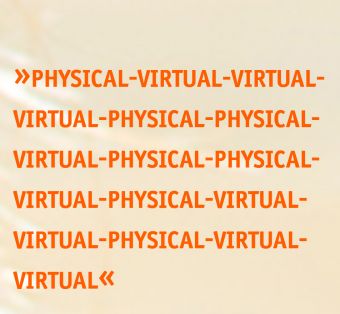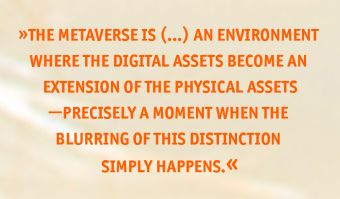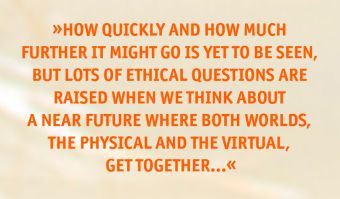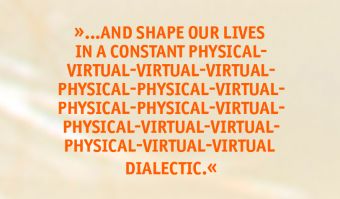
physical-virtual-virtual-virtual-physical-physical-virtual-physical-physical-virtual-physical-virtual-virtual-physical-virtual-virtual
Alejandra Panighi, Strategic Consutant at Mediapro, Madrid

physical-virtual-virtual-virtual-physical-physical-virtual-physical-physical-virtual-physical-virtual-virtual-physical-virtual-virtual
In which metaverse do we want to live?
The Metaverse—A ubiquitous, synchronised universe where presence and sense of presence become indistinguishable.
For those of us who were born in the 20th century, the word „metaverse“ came to be associated with science fiction books and films of the 1990s which depict a dystopian future dominated by technology. In most of them, humanity is dominated by mega corporations, totalitarian governments or dehumanised scientists who use simulated worlds and robotic environments to subject people to situations of oppression, domination and injustice.
But for those who grew up with the online world as an integrated space within the physical world, the metaverse is simply a collection of all the virtual universes that coexist in the cloud and are necessarily shared, interactive, immersive and collaborative.
The metaverse is, for this generation, understood as an environment where the digital assets become an extension of the physical assets—precisely a moment when the blurring of this distinction simply happens.
It began perhaps with the mobile internet, and just accelerated with advances in the use of AR (Augmented Reality), VR (Virtual Reality) and AI (artificial intelligence) until becoming an increasingly present and ubiquitous mixed reality.
Creative industries, particularly video games, went deep into this concept of real-digital and digital-real, making immersive experiences a language of a generation who learned to live and enjoy these environments in which the physical person and its own digital extension coexist and converge.

It is now the same generation that expects to integrate into this metaverse all the other aspects of their lives: sports, social activities, academic life, travel, work and global economy.
For several years, the narrative about this metaverse, as something real outside of films and books, was captive of those who worked to revolutionise the actual rules of Internet, developing the virtual economy from different but close perspectives. It was almost a cryptic universe, accessible to those who could quickly understand the token economy and its fungible and non-fungible tokens and the rules of permissions and permissionless environments—among many other concepts—in which „old“ inventions like Napster would have been unstoppable.
That is until 2021, when Facebook divested itself of its original brand and became Meta by announcing multi-million-dollar investments in augmented and virtual reality, robotics, high-tech VR glasses and sophisticated software applications to make the old Facebook social media network an environment for communication, fun and work in the metaverse.
Other giants of the internet 2.0 era such as Google, Microsoft or Apple also unveiled their plans to develop virtual environments with huge investments. This sudden trust in the virtual economy became a fillip for hundreds of start-ups who could suddenly access a flood of money in projects that few months ago previously have been considered extremely risky. How quickly and how much further it might go is yet to be seen, but lots of ethical questions are raised when we think about a near future where both worlds, the Physical and the Virtual, get together and shape our lives in a constant physical-virtual-virtual-virtual-physical-physical-virtual-physical-physical-virtual-physical-virtual-virtual-physical-virtual-virtual dialectic.

There are at least two main visions of how this Metaverse should be…
One is inherited from the current model of society, led by closed platforms and Big Tech that are not necessarily the bad boys of so many dystopian novels. But there are indeed few and dominant players of the digital economy of the 21st century. They claim the central role such huge machines should be allowed to have, to make this Metaverse happen in an ordered and controlled way, far from actual wilderness of the internet sphere that includes the worst we can see from ourselves in the deep and dark web.
Another vision, in stark contrast, talks about an Open Metaverse created with open technology and open protocols that allow increasingly decentralised and accessible environments for almost anyone. This is the vision of those creators of—and believers in—Web 3.0, which has been evolving for at least 10 years. They advocate for an Open Metaverse based on principles of digital sovereignty and easy access to data and protocols for people to achieve a new world economic order, an order perhaps better, perhaps fairer, perhaps more promising for those who now lie at the bottom of the actual world’s economy.
A third vision, probably the most plausible one, is a coexistence of both centralised and decentralised visions, convergent and divergent environments in which any kind of ordering or regulation will be complex but might prove necessary.
In any case, during the next few years we will experience a true ethical, moral, ideological and economic revolution that is somehow reminiscent of the profound change in society that took place during the Renaissance.
In these times, we will see the scaling of this virtual-based economy, environmental challenges, not only those arising from the digital economy but also those inherited from the current economy, new jobs and the transition between the old jobs and the new ones, and so many other challenges and so many inconsistencies in the meantime.
We’ll need to go through a deep revision of the grounds of Internet, the deepest since it was born:
– the whole process of capture and control of data
– the cost of electricity or other renewable power sources
– accessibility to digital resources
– the conversion from actual sleeping goods in Cloud wallets to the commercial retail system
– the backend of the internet (hardware and software)
– the actual network and nation-based technical infrastructure
– operating systems.
… And so many other concepts raising from the revision of these basic ones.
But also, rethinking what identity means, what belonging means. What is a community? What is fandom? Or random? The possibility of

multiple identities for each person—physical and digital—and a possible total sovereignty for each opens up an unexplored universe.
The sovereignty of identity in the physical world, in the virtual world and in what emerges from the combination of both universes for future generations may completely change social relations in the decades to come.
Somehow, once again, as in Europe’s First Renaissance, the New Renaissance will be all about the convergence of Culture, Economy and Technology.
Alejandra Panighi
Born in Argentina, she started her career in TV in America as producer and journalist, but she was always attracted by all ways of storytelling in almost any written or visual formats too.So it was not a surprise when, in early 90’s, she joined the team that launched Yahoo and AOL portals in the American continent, when they were still a web directory of content curated by people. She experimented with live shows and live interviews with musicians, interacting also with those the few users who could access dial up connections for several minutes. Living in Europe for the last 20 years, she’s been focused in innovation of the film, series, live sport and eSports industries, looking for different business models and new ways of reaching audiences. She embraces technology as a driver for innovation and follows consumer’s behaviour with passion. From VR-XR to immersive experiences, from data management to AI and moving now in the arena of virtual economy her wide expertise on the evolution of the Audiovisual industry is an asset. Focused in EU policy for the last decade, she lives in Brussels and works as a strategic consultant for Mediapro Group, dealing directly with the Board of Directors.
Picture © Pepe Encinas (Barcelona, Spain)

